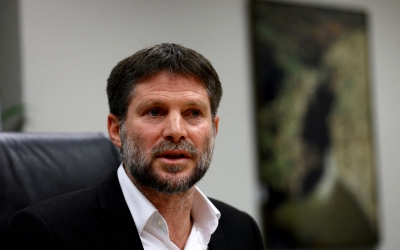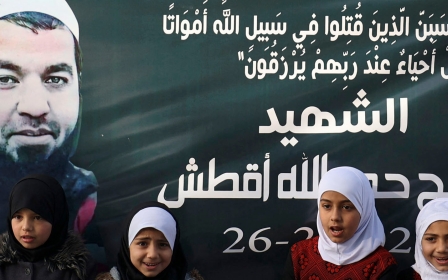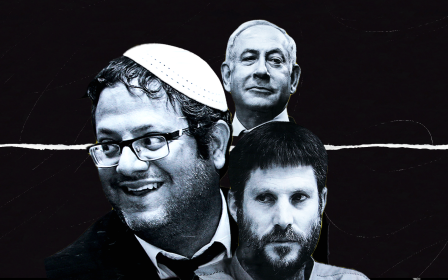Activists cite long history of US visa bans to deny Smotrich entry

Activists and rights groups are demanding the Biden administration ban Israeli Finance Minister Bezalel Smotrich from entering the US after he called for "wiping out" a Palestinian town, citing Washington's history of banning foreign officials over concerns regarding human rights or religious freedom.
Smotrich, who also serves as Israel's minister in charge of civil administration in the occupied West Bank, is expected to be travelling to the United States next week to attend a finance conference hosted by Israel Bonds in Washington.
Earlier this month, Smotrich called for the Palestinian village of Huwwara to be "wiped out", comments that coincided with hundreds of Israeli settlers violently rampaging through the streets of Huwwara, killing one person, injuring hundreds of others, and burning dozens of cars. The settler riot, or what many are calling a pogrom, came after a shooting that killed two Israelis in the town of Huwwara earlier that day.
'It is time for Biden to end US complicity in Israel's violent apartheid'
- Beth Miller, Jewish Voice for Peace Action
Since then, a myriad of rights groups has called for the far-right minister to not be allowed entry into the US, ranging from Palestinian advocacy groups to pro-Israel organisations in the US.
"It is time for Biden to end US complicity in Israel's violent apartheid. Under no circumstances should Bezalel Smotrich be permitted to visit the US," Beth Miller, political director of Jewish Voice for Peace Action, told Middle East Eye.
New MEE newsletter: Jerusalem Dispatch
Sign up to get the latest insights and analysis on Israel-Palestine, alongside Turkey Unpacked and other MEE newsletters
The US State Department referred MEE to spokesperson Ned Price's comments during a press briefing last week, in which he said: "We don't speak to individual visa records nor, as a general matter, to a particular individual's eligibility for a US visa."
However, several US and Israeli news outlets reported the US is considering whether to issue the visa to Smotrich as the White House assesses the situation.
Several rights advocates told MEE that the US has for decades banned the entry of foreign individuals and politicians, including Israeli Knesset Michael Ben Ari over ties to the Kach party in Israel, which the US considers a terrorist group.
"The US government has used visa denials to send political messages throughout history," Suchitra Vijayan, director of the Polis Project in New York City told MEE. "These political messages are particular to their times."
Modi-Smotrich
One connection that could be drawn is the US decision to revoke a visa for Narendra Modi, then-chief minister of India's Gujarat province during the anti-Muslim pogroms in Gujarat in 2002.
In 2005, the US denied a visa to India's current prime minister Narendra Modi, who was then the chief minister of the Gujarat province at the time of the anti-Muslim pogroms that left around 2,000 dead three years prior.
The decision to deny Modi a visa was based on a 1998 US law regarding freedom of religion, as Hindu mobs attacked Muslim minorities under the Indian minister's watch. Meanwhile, Smotrich's remarks came as far-right Jewish settlers attacked Palestinian communities.
"There's a potential connection that could be drawn to Modi that could be cited as precedent to ban Smotrich," Adam Shapiro, Democracy for the Arab World Now's advocacy director for Israel-Palestine, told MEE.
In March 2005, then-US ambassador to India David Mulford said during remarks in New Delhi that Modi was "responsible for the performance of state institutions at that time" of the riots in Gujarat and therefore ineligible for a US visa.
So far, Modi has been the only foreign government official denied entry on the basis of the religious freedom law. Other foreign government officials, including two Russian officials, have been banned for religious freedom violations under a separate US law.
Smotrich's position as head of Israel's civil administration in the West Bank places him in a similar position to Modi in being responsible for state institutions at the time of the settler riots last month.
In 2021, Smotrich threatened to expel Muslims who did not accept Jewish rule over the land. Far-right Israeli settlers in the occupied West Bank have often attacked communities of Palestinians, the majority of whom are Muslim - and there are also sizable Palestinian Christian populations.
Videos on social media showed far-right Israeli settlers praying together after the riots in Huwwara last month.
But according to Zahir Janmohamed, a visiting assistant professor at Bowdoin College who worked on the campaign to deny Modi a visa, using the religious freedom path would not work against Smotrich, given that the US doesn't see Israeli human rights abuses through the lens of religious freedom.
"From my experience working on the Modi campaign, we had a body of material from [US government] sources -DoS reports, USCIRF reports - about religious freedom violations in Gujarat in 2002," Janmohamed told MEE.
"[US government] documents don't really classify violations against Palestinians as [international religious freedom] issues, unless it is a Christian being targeted by a Muslim group," he said.
The US Commission on International Religious Freedom (USCIRF) told MEE that Smotrich's comments alone would not constitute a visa ban under the International Freedom Act because they "were not related to religion".
Consequences of visa bans
Throughout history, the US has denied visas to individuals for what rights groups have critically deemed "ideological exclusions". Those who have been barred include renowned literary figures such as Chilean poet and Nobel Laureate Pablo Neruda and Palestinian poet Mahmoud Darwish, among many others not allowed into the US on the sole basis of their political beliefs.
But a move to deny Smotrich would be unprecedented, given his senior position in the Israeli government. An Israeli official told Axios that State Department officials "hinted" to Israeli diplomats that Washington would be happy if Smotrich decided to cancel his trip.
The reported consideration of the State Department to deny Smotrich a visa also alludes to a greater dilemma for the administration in how to deal with the new far-right Israeli government, led by Prime Minister Benjamin Netanyahu.
Criticism of the Israeli government was previously conducted largely by rights groups, progressive Jewish organisations, Palestinian activists, and other progressives. Since the new Israeli government came into power, pro-Israel and liberal Jewish institutions have also condemned the Netanyahu-led coalition in power and called for Smotrich to be barred from entry into the US.
The State Department labelled Smotrich's comments as "repugnant" and a US official told Axios that no Biden administration official will meet with the minister. Meanwhile, the current Israeli government is forcing a reassessment of support for Israel among some liberal Jewish-American communities.
In a statement by Democracy for the Arab World Now (Dawn), the rights group stated that the Israeli minister could be banned under several different US laws, citing that he "possibly committed the act of incitement to genocide", as well as undermined "democratic processes and institutions in Israel".
'The US government has done nothing to hold the Israeli government accountable'
- Suchitra Vijayan, Polis Project
Vijayan of the Polis Project said, however, that a visa denial is unlikely, given that the US has a history of not holding governments accountable for human rights abuses.
She cited the US response to Saudi Arabia and the killing of columnist Jamal Khashoggi; Israel and the killing of journalist Shireen Abu Akleh; and the Indian government and the revocation of Article 370, the clause in India's constitution that illuminated Kashmir's semi-autonomous status within the Indian Union.
"The US government has done nothing to hold the Israeli government accountable," said Vijayan of the Polis Project. "I'm not convinced a visa denial [against Smotrich] is going to come from the Biden administration."
In the long term, a visa denial may not even serve as consequential for a politician like Smotrich. In the case of India's Modi, by 2014, his visa ban was reversed after he was elected as prime minister of the country.
But in referring to Smotrich's plans to meet with the Israel Bonds organisation, Shapiro told MEE: "In the immediate term, visa bans can have significant consequences, especially for someone like Smotrich who is coming to the US for a meeting with Israel Bonds."
Middle East Eye delivers independent and unrivalled coverage and analysis of the Middle East, North Africa and beyond. To learn more about republishing this content and the associated fees, please fill out this form. More about MEE can be found here.





